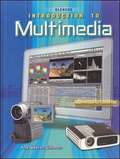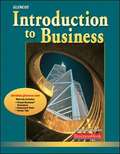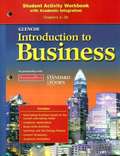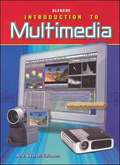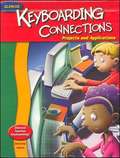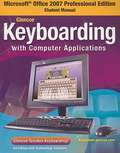- Table View
- List View
Glencoe Integrated iScience, Course 2
by Juli Berwald Michelle Anderson American Museum of Natural HistoryNIMAC-sourced textbook
Glencoe Integrated iScience, Course 3
by Juli Berwald Michelle Anderson American Museum of Natural HistoryNIMAC-sourced textbook
Glencoe Integrated iScience, Course 3
by Juli Berwald Michelle Anderson American Museum of Natural HistoryNIMAC-sourced textbook
Glencoe Integrated iScience, Grade 6
by Juli Berwald Michelle Anderson American Museum of Natural HistoryNIMAC-sourced textbook
Glencoe Integrated iScience, Grade 6
by Juli Berwald Michelle Anderson John F. BolzanNIMAC-sourced textbook
Glencoe Integrated iScience, Grade 8
by Juli Berwald Michelle Anderson American Museum of Natural HistoryNIMAC-sourced textbook
Glencoe Integrated iScience, Grade 8
by Juli Berwald Michelle Anderson American Museum of Natural HistoryNIMAC-sourced textbook
Glencoe Integrated iScience, Grade 8
by Juli Berwald Michelle Anderson John BolzanNIMAC-sourced textbook
Glencoe Integrated iScience, Grade 8
by Juli Berwald Michelle Anderson John F. BolzanNIMAC-sourced textbook
Glencoe Integrated iScience, Grade 8, Science Notebook
by McGraw-Hill EducationNIMAC-sourced textbook
Glencoe Integrated iScience: Grade 7
by Juli Berwald Michelle Anderson American Museum of Natural HistoryNIMAC-sourced textbook <p>Grade 7</p>
Glencoe Integrated iScience: Interactive Science Essentials, Grade 7 (CUS iScience)
by McGraw-Hill EducationNIMAC-sourced textbook <p>Grade 7</p>
Glencoe Integrated iScience: Interactive Science Essentials, Grade 8
by McGraw-Hill EducationNIMAC-sourced textbook
Glencoe Introduction To Business: Student Edition (Brown: Intro To Business)
by McGraw-Hill Education StaffMcGraw-Hill's Introduction to Business provides an overview of the world of business covering basic economic concepts, owning and operating a business, globalization, personal financial planning, and more. Introduction to Business provides your students with research-based reading strategies and integrated academic activities to build comprehension and reinforce key academic concepts, all within the context of business topics. Includes print Student Edition
Glencoe Introduction To Multimedia
by Ana Weston SolomonIntroduction to Multimedia is designed to help you become a skilled and creative user of current multimedia technology. The purpose of this course is to increase your understanding of multimedia concepts and techniques. You are the reason that this textbook was written. Multimedia is a vast and exciting domain.
Glencoe Introduction to Business
by Betty J. Brown John E. ClowIntroduction to Business explains the most current business practices, providing an outstanding overview. This colorful, user-friendly textbook is regarded as the most comprehensive introductory high school business book on the market! Introduction to Business includes BusinessWeek seminars and feature stories, integrated technology, an introduction to personal finance, and a cutting-edge online simulation that gives students a powerful opportunity to practice their new skills.
Glencoe Introduction to Business (Brown: Intro To Business Ser.)
by Betty J. Brown John E. ClowNIMAC-sourced textbook
Glencoe Introduction to Business, Student Activity Workbook with Academic Integration
by Glencoe McGraw-Hill StaffNIMAC-sourced textbook
Glencoe Introduction to Criminal Justice
by Robert M. Bohm Keith N. HaleyPrepares Students for Careers in Protective Services!
Glencoe Introduction to Multimedia
by Ana Weston SolomonThis complete guide describes types of multimedia productions, how multimedia affects society, and the components and tools that are used to produce a multimedia product. Independent and collaborative exercises promote an interactive learning environment within a project-based framework.
Glencoe Keyboarding Connections: Projects and Applications
by Julie Jaehne Arlene ZimmerlyStudents will learn keyboarding and complete numerous hands-on projects related to word processing, desktop publishing, presentation software, spreadsheets, and databases. The text was written for middle school students. All activities and projects are age-appropriate. Keyboarding Connections features a "fun" format complemented by a visually appealing game-like software interface. High-interest skill building exercises, applications, and games consistently hold students' attention. All new content includes extensive practice with e-mail, PowerPoint®, and Web page design. An Internet Connection feature provides search tips and relevant links. A user-friendly Web site features include State correlations, language arts activities, and additional teacher resources. Plus, everything is Windows 2000 and XP compatible!
Glencoe Keyboarding with Computer Applications
by McGraw-HillMicrosoft Word 2007 is a powerful word processing program. Using this program, you can create documents that contain tables, artwork, and decorative fonts.




